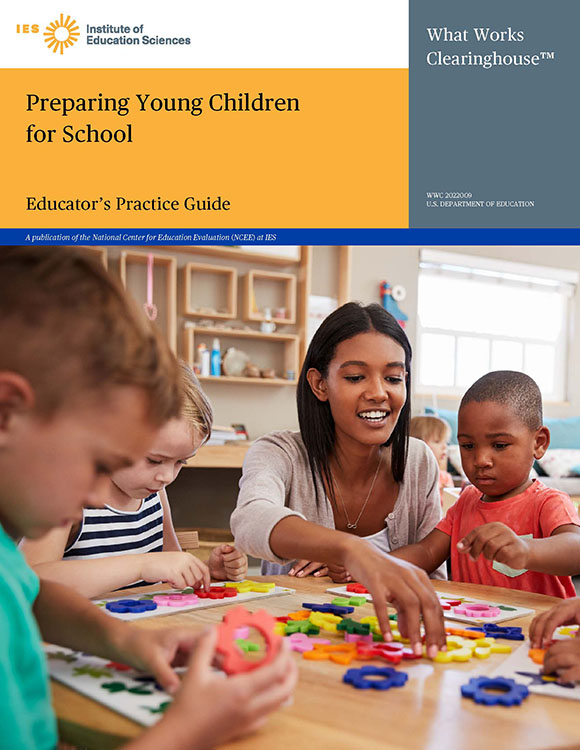Home Blogs Idaho Partnership Aims to Enhance Access and Quality of Early Care and Education
Idaho Partnership Aims to Enhance Access and Quality of Early Care and Education
Northwest | October 20, 2022
When children are engaged with early childhood services, particularly in well-designed and implemented educational settings such as preschool and kindergarten, their lifelong well-being is positively affected.1
Based on recent early learning and school readiness research, the What Works Clearinghouse released a new Practice Guide, Preparing Young Children for School. The practice guide distills research into practical recommendations, detailing seven evidence-based practices that educators, state and local officials, and parents and caregivers can use to ensure children have the skills they need to be successful in school.
Each of the seven recommendations provides a specific strategy that the Practice Guide’s expert panelists suggest schools or districts implement to address an educational challenge. The recommendations are to:

- Regularly provide intentional, engaging instruction and practice focused on social-emotional skills.
- Strengthen children’s executive function skills using specific games and activities.
- Provide intentional instruction to build children’s understanding of mathematical ideas and skills.
- Engage children in conversations about mathematical ideas and support them in using mathematical language.
- Intentionally plan activities to build children’s vocabulary and language.
- Build children’s knowledge of letters and sounds.
- Use shared book reading to develop children’s language, knowledge of print features, and knowledge of the world.
In the Northwest, the Idaho Association for the Education of Young Children assessed the availability of high-quality pre-K services in the state and identified opportunities for collaboration among stakeholders for strengthening the transition between early childhood programs and the K-12 system. Based on its assessment, the association released the 2021 Early Childhood Care and Education Strategic Plan for Idaho, articulating goals around expanded early learning choices for families, evidence-based programming, and school readiness.
REL Northwest is partnering with West Central Mountains Early Learning Advisory Committee, one of 15 early learning collaboratives across the state of Idaho, to enhance the access and quality of early care and education in the region to improve early literacy learning for kindergarten readiness.
A 2020 needs assessment by the West Central Mountains Early Learning Advisory Committee found that the region has a significant shortage of quality early childhood programming, straining families, social systems, and employers. The needs assessment identified a growing gap between the demand for quality early care and education, and the limited supply in the rapidly growing region. Families need support to ensure their children are ready to succeed in school.
REL Northwest is providing technical support around articulating and measuring the committee’s early learning initiative objectives and selecting, implementing, and evaluating evidence-based programming for early literacy. As identified in our partnership logic model, the work will support continuous improvement around implementing evidence-based practices, with the long-term goal of improving kindergarten readiness as measured by the Idaho Reading Indicator.
Initial partnership activities have included capacity building around logic model development to guide the work of the initiative and the drafting of a project evaluation plan to monitor outcomes.
ADDITIONAL EARLY CHILDHOOD EDUCATION RESOURCES
- REL Southeast developed an infographic that provides several evidence-based practices and resources that families can use to increase their students’ school readiness.
- The Early Childhood Data Use Assessment Tool from REL Central helps identify and improve data-use skills among early childhood education program staff to better use data to inform, plan, monitor, and make decisions for instruction and program improvement.
- REL West hosted a webinar series on storybook reading, culturally affirming instruction, and connecting with parents and families. This series was designed to help pre-K–1st-grade educators learn a routine for storybook reading, explore ideas for creating school-to-home connections, and extend storybook reading to creative expression activities.
- REL Appalachia’s Community Math Night Facilitators’ Toolkit provides tips for K-5 educators to engage families in building positive math attitudes, facilitate their participation in children’s math learning, and build a community of caring adults to support students.
- For more than 20 years, the National Center for Education Statistics has collected information about kindergartners’ knowledge and skills as part of the Early Childhood Longitudinal Studies (ECLS) program.
- ECDataWorks developed the Expanded School Readiness Framework to help states explore the preparedness of schools, communities, and children. Read the action brief, view the video, and download the framework.
ABOUT THE AUTHOR
Claire Morgan is a Senior Researcher at WestEd and leads the Idaho Early Childhood Partnership for REL Northwest.
1 Cannon, J.S., Kilburn, M.R., Karoly, L.A., Mattox, T., Muchow, A.N., and Buenaventura, M. (2017). Investing Early: Taking Stock of Outcomes and Economic Returns From Early Childhood Programs. Santa Monica, CA: RAND Corporation. Retrieved September 20, 2022, from https://www.rand.org/pubs/research_reports/RR1993.html.
Author(s)

Claire Morgan
Connect with REL Northwest